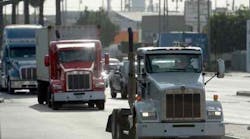A group of northeastern states has agreed to develop a new cap-and-trade system aimed at cutting carbon emissions from the transportation sector.
In the coming year, they will design a regional low-carbon transportation proposal through a "cap-and-invest program or other pricing mechanism." Each jurisdiction would then decide whether to adopt and implement the policy.
This pact includes Connecticut, Delaware, Maryland, Massachusetts, New Jersey, Pennsylvania, Rhode Island, Vermont, Virginia, and Washington, DC.
Notably, it does not include New York, New Hampshire, or Maine, though these three states are also part of the Transportation and Climate Initiative (TCI). The states still could become part of the cap-and-trade system once it is created.
Proceeds from the program would then be invested into low-carbon and more resilient transportation infrastructure. The group said it aims to create consistency across jurisdictional boundaries and the levels at which to cap emissions.
"I am confident this will put us on a path to not only decarbonize our transportation networks, but significantly improve them as well,” said Connecticiut Gov, Dannel P. Malloy.
“In the absence of an effective national strategy on climate change, states must innovate and lead to protect the health, safety, and livelihoods of our people, communities, and businesses,” said Rhode Island Gov. Gina M. Raimondo
Cap-and-trade proposal have drawn significant opposition in recent years. In response, the group said it will look for parternships between government and private enterprise and “ensure that the benefits and burdens of both the pricing mechanism and investments are shared equitably across communities.”
This announcement comes just days after California approved a measure requiring public transit agencies in the state to transition to 100% zero-emission buses by 2040. This could further help the development of all-electric commercial vehicles in the coming years, though there remain a number of hurdles to overcome.



